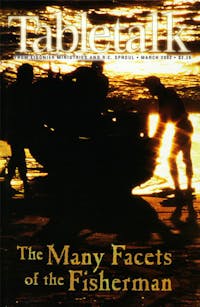
Request your free, three-month trial to Tabletalk magazine. You’ll receive the print issue monthly and gain immediate digital access to decades of archives. This trial is risk-free. No credit card required.
Try Tabletalk NowAlready receive Tabletalk magazine every month?
Verify your email address to gain unlimited access.
God’s sovereignty often surprises us. It’s all well and good that He who holds the oceans in His hands should determine the rise and fall of empires. Neither should we be surprised that He numbers the very hairs on our heads. We affirm that He controls all things, great and small. But then I wonder about the things we don’t even notice. Wouldn’t it be like God not only to knit together diversity in the church to create one body of Christ, but to do it in history as well? I wonder whether God has given different heroes for different saints. Some inspire me, others inspire you.
John Calvin was a genius, his mind a steel trap. When we think of him, we see his frail body hunched over his furiously writing pen. I love Calvin and admire him, but for sheer inspiration, give me Martin Luther. Calvin was a man of courage, but Luther wore his courage on his sleeve. Calvin was a man of careful thinking, Luther a burst of brilliance followed by some glaring weakness. The Reformation needed both men, and, in like manner, we need men of both types today.
One could argue that a similar pattern prevailed in the early church. No one could rightly call the apostle Paul a shrinking violet or suggest that he was not a man of passion. But our image of him is not unlike our image of Calvin—what stands out is the power of the intellect. Paul was a thinker, a systematizer. But when we think courage, brilliance, and, of course, frequent weaknesses, we think of Peter. Peter spoke with such fervor and zeal that we should not be surprised that he sometimes found his foot in his mouth. It was he who boldly proclaimed, “ ‘You are the Christ, the Son of the living God,’ ” and it was he who, upon learning of Jesus’ calling to go to Jerusalem and die, uttered that most foolish of oxymorons, “No, Lord.” It was he who drew his sword when the Roman soldiers appeared in the garden, and he who denied his Lord three times.
As we live our lives coram Deo, before the face of God, we are acutely aware of our own shortcomings. His glory highlights our weaknesses. But it is His glory to use the weak and foolish things of this world for the building of Christ’s kingdom. He is the God who sovereignly makes straight lines with crooked sticks, like you and me and the impetuous Peter.
